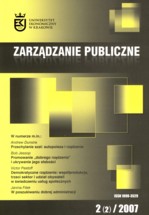Tipping the balance: autopoiesis and governance
Keywords:
modern society, autopoietic systems, control of social systems, subsidies, partnership with intermediary organizations, reflection law, colibacy, monocentrism, polycentrismAbstract
A modern society, according to autopoietic and other analyses, comprises social systems that show organizational closure and self-referentiality, partly explaining widely perceived regulatory failure. This article compares four possible mechanisms for governance or steering of such systems, compatible with their autopoiesis: the use of subsidy, partnership with intermediary bodies, reflexive law, and a technique of government intervention that is ancient and common but not recognized, here named collibration. Some social actors exist mainly to check and balance other actors (e.g., employers’ organizations and trade unions, or buyers and sellers in a market) and are self-referential only as a pair system. This pair system is then self-policing but can be steered, within limits, by tipping the balance that is being maintained – as exemplified by price-loading taxes, cooling-off periods, and sport handicapping.



